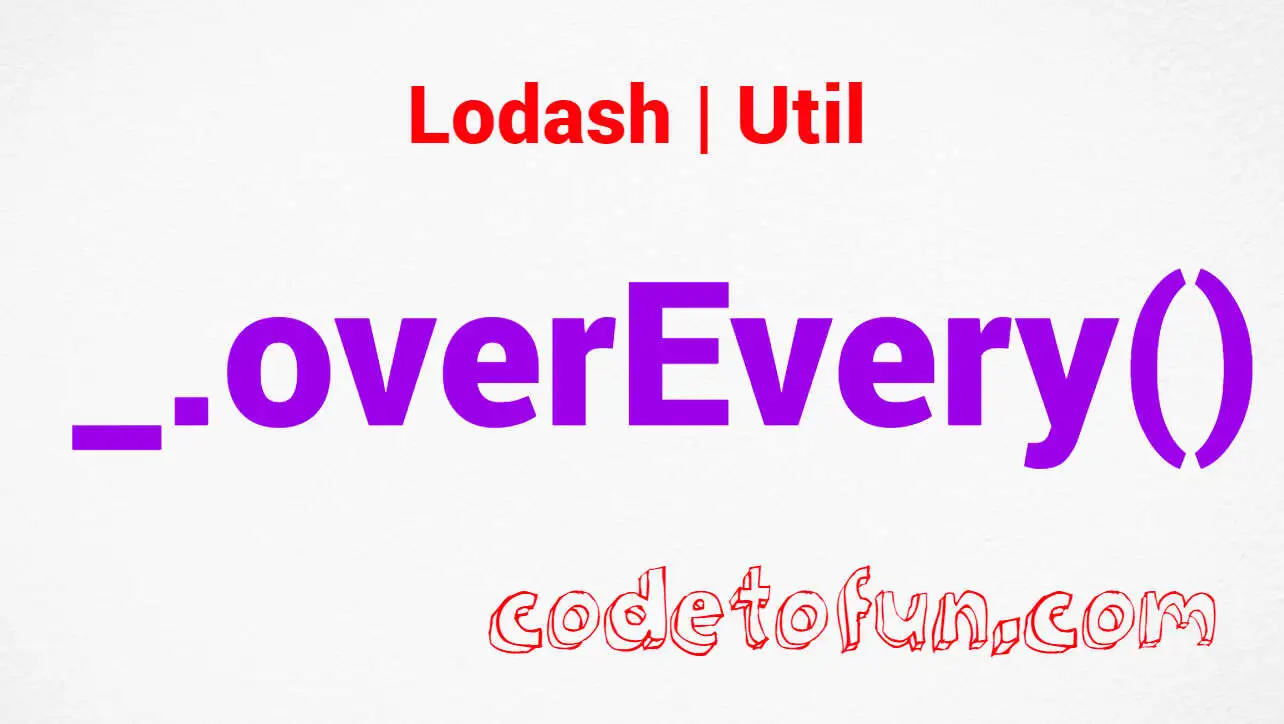
Lodash Home
- Lodash Intro
- Lodash Array
- Lodash Collection
- Lodash Date
- Lodash Function
- Lodash Lang
- Lodash Math
- Lodash Number
- Lodash Object
- Lodash Seq
- Lodash String
- Lodash Util
- _.attempt
- _.bindAll
- _.cond
- _.conforms
- _.constant
- _.defaultTo
- _.flow
- _.flowRight
- _.identity
- _.iteratee
- _.matches
- _.matchesProperty
- _.method
- _.methodOf
- _.mixin
- _.noConflict
- _.noop
- _.nthArg
- _.over
- _.overEvery
- _.overSome
- _.property
- _.propertyOf
- _.range
- _.rangeRight
- _.runInContext
- _.stubArray
- _.stubFalse
- _.stubObject
- _.stubString
- _.stubTrue
- _.times
- _.toPath
- _.uniqueId
- Lodash Properties
- Lodash Methods
Lodash _.overEvery() Util Method

Photo Credit to CodeToFun
🙋 Introduction
In the landscape of JavaScript programming, handling multiple conditions and ensuring they all evaluate to true can be a cumbersome task. Enter Lodash, a powerful utility library that simplifies complex operations. Among its arsenal of functions lies the _.overEvery() method, a versatile tool for creating a predicate function that checks if all provided conditions are truthy.
This method streamlines conditional logic, offering concise and readable code for developers.
🧠 Understanding _.overEvery() Method
The _.overEvery() method in Lodash creates a predicate function that checks if all provided predicates return truthy values when applied to a given set of arguments. This allows developers to define multiple conditions and easily determine if they are all satisfied, simplifying complex logic.
💡 Syntax
The syntax for the _.overEvery() method is straightforward:
_.overEvery([predicates])- predicates: An array of functions to be evaluated.
📝 Example
Let's dive into a simple example to illustrate the usage of the _.overEvery() method:
const _ = require('lodash');
const isEven = num => num % 2 === 0;
const isGreaterThanTen = num => num > 10;
const isEvenAndGreaterThanTen = _.overEvery([isEven, isGreaterThanTen]);
console.log(isEvenAndGreaterThanTen(12));
// Output: true
console.log(isEvenAndGreaterThanTen(7));
// Output: falseIn this example, isEvenAndGreaterThanTen is a predicate function created using _.overEvery() that checks if a number is both even and greater than ten.
🏆 Best Practices
When working with the _.overEvery() method, consider the following best practices:
Composing Predicates:
Compose simple and reusable predicates that encapsulate individual conditions. This promotes code readability and maintainability, allowing for easy modification and extension.
example.jsCopiedconst isPositive = num => num > 0; const isEven = num => num % 2 === 0; const isPositiveAndEven = _.overEvery([isPositive, isEven]); console.log(isPositiveAndEven(6)); // Output: trueParameterized Predicates:
Consider parameterizing predicates to increase their flexibility and reusability across different contexts. This enables you to create more dynamic and adaptable predicate functions.
example.jsCopiedconst isDivisibleBy = divisor => num => num % divisor === 0; const isDivisibleByTwoAndThree = _.overEvery([isDivisibleBy(2), isDivisibleBy(3)]); console.log(isDivisibleByTwoAndThree(12)); // Output: trueError Handling:
Implement appropriate error handling mechanisms to gracefully handle edge cases or invalid inputs when composing predicates. This enhances the robustness and reliability of your code.
example.jsCopiedconst isString = val => typeof val === 'string'; const isLengthGreaterThanZero = val => val.length > 0; const isNonEmptyString = _.overEvery([isString, isLengthGreaterThanZero]); console.log(isNonEmptyString('Hello')); // Output: true console.log(isNonEmptyString('')); // Output: false
📚 Use Cases
Form Validation:
_.overEvery()is ideal for form validation scenarios where multiple conditions need to be satisfied before submitting the form. By composing predicates for each validation rule, you can ensure data integrity and accuracy.example.jsCopiedconst isRequired = val => val !== undefined && val !== null && val !== ''; const isEmail = val => /\S+@\S+\.\S+/.test(val); const validateEmail = _.overEvery([isRequired, isEmail]); console.log(validateEmail('example@email.com')); // Output: true console.log(validateEmail('')); // Output: falseAccess Control:
In access control mechanisms,
_.overEvery()can be used to determine whether a user meets all required criteria for accessing a resource or performing a specific action. By combining predicates representing different access requirements, you can enforce strict access control policies.example.jsCopiedconst isAdmin = user => user.role === 'admin'; const isVerified = user => user.status === 'verified'; const hasAdminPrivileges = _.overEvery([isAdmin, isVerified]); console.log(hasAdminPrivileges({ role: 'admin', status: 'verified' })); // Output: true console.log(hasAdminPrivileges({ role: 'user', status: 'verified' })); // Output: falseData Filtering:
When filtering data based on multiple criteria,
_.overEvery()facilitates concise and expressive code. By composing predicates representing different filter conditions, you can efficiently extract relevant subsets of data.example.jsCopiedconst products = [ { name: 'Laptop', price: 1200, brand: 'Dell' }, { name: 'Smartphone', price: 800, brand: 'Samsung' }, { name: 'Tablet', price: 400, brand: 'Apple' } ]; const filterExpensiveDellProducts = _.filter(products, _.overEvery([product => product.price > 1000, product => product.brand === 'Dell'])); console.log(filterExpensiveDellProducts); // Output: [{ name: 'Laptop', price: 1200, brand: 'Dell' }]
🎉 Conclusion
The _.overEvery() method in Lodash empowers developers to create predicate functions that evaluate multiple conditions with ease. Whether you're implementing form validation, access control, or data filtering, this versatile utility method provides a concise and expressive solution for handling complex logic in JavaScript.
By adhering to best practices and exploring diverse use cases, you can harness the full potential of the _.overEvery() method in your Lodash projects.
👨💻 Join our Community:
Author

For over eight years, I worked as a full-stack web developer. Now, I have chosen my profession as a full-time blogger at codetofun.com.
Buy me a coffee to make codetofun.com free for everyone.
Buy me a CoffeeShare Your Findings to All
Recent Post in lodash


Lodash _.templateSettings.imports Property

Lodash _.templateSettings.evaluate Property

Lodash _.templateSettings Property

Lodash _.templateSettings.escape Property

Lodash _.templateSettings.interpolate Property








If you have any doubts regarding this article (Lodash _.overEvery() Util Method), please comment here. I will help you immediately.